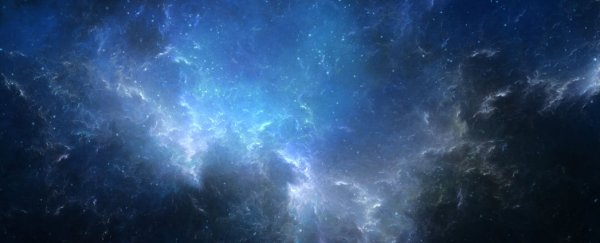Physicists have come up a new calculation for when the Universe will stop expanding and collapse in on itself - which, as you can imagine, is very bad news for all matter inside - and predict that it will happen in the next tens of billions of years or so.
By human standards, that's a pretty long way away, to put it lightly. But on a cosmological timescale, the researchers are calling it 'imminent', and say the collapse is coming much too soon. "The fact that we are seeing dark energy now could be taken as an indication of impending doom, and we are trying to look at the data to put some figures on the end date," one of the team, Antonio Padilla from the University of Nottingham in the UK, told Lisa Zyga at Phys.org.
In proposing their new 'cosmological collapse mechanism', the team set out to answer one of the most difficult questions in physics - why is the expansion rate of the Universe currently accelerating?
Back in 1917, when it hadn't occurred to scientists that the Universe could be expanding, Einstein came up with his 'cosmological constant', which quantified the energy density of the vacuum of space and balanced out the attraction of matter. A little over a decade later, when astronomer Edwin P. Hubble realised that the Universe was actually expanding, Einstein rejected the idea of a cosmological constant, but more recently, physicists have proposed that dark energy could be filling that role.
Dark energy is a low-mass form of energy that physicists now think makes up roughly 68 percent of the Universe. Dark matter makes up about 27 percent of it, and 'normal' matter contributes less than 5 percent. The problem with this? Theoretically, that super-high percentage of dark matter should only allow the growth of a tiny universe, not the huge one we know and love, because it'd be expanding too rapidly for galaxies to have a chance to form.
"According to the new mechanism, the Universe originated under a set of specific initial conditions so that it naturally evolved to its present state of acceleration and will continue on a path toward collapse. In this scenario, once the collapse trigger begins to dominate, it does so in a period of 'slow roll' that brings about the accelerated expansion we see today. Eventually the Universe will stop expanding and reach a turnaround point at which it begins to shrink, culminating in a 'big crunch'."
The team has published their calculations in the journal Physical Review Letters. Kudos to the duo for publishing a paper about the demise of the Universe and calling it, simply, 'The End'.
"I think we have opened up a brand new approach to what some have described as 'the mother of all physics problems', namely the cosmological constant problem," Padilla told Phys.org. "It's way too early to say if it will stand the test of time, but so far it has stood up to scrutiny, and it does seem to address the issue of vacuum energy contributions from the standard model, and how they gravitate."
It's a lot to wrap your head around, and Padilla does a great job at discussing it in the video below. Just know that if Padilla and Kaloper are right, you've got at least tens of billions of years to get your things in order and move universes, so that's good.
Source: Phys.org
